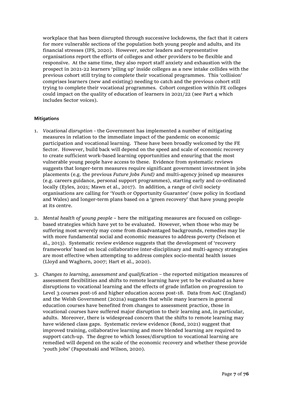
Page 7 of 76
workplace that has been disrupted through successive lockdowns, the fact that it caters
for more vulnerable sections of the population both young people and adults, and its
financial stresses (IFS, 2020). However, sector leaders and representative
organisations report the efforts of colleges and other providers to be flexible and
responsive. At the same time, they also report staff anxiety and exhaustion with the
prospect in 2021-22 learners 'piling up' inside colleges as a new intake collides with the
previous cohort still trying to complete their vocational programmes. This 'collision'
comprises learners (new and existing) needing to catch and the previous cohort still
trying to complete their vocational programmes. Cohort congestion within FE colleges
could impact on the quality of education of learners in 2021/22 (see Part 4 which
includes Sector voices).
Mitigations
1. Vocational disruption - the Government has implemented a number of mitigating
measures in relation to the immediate impact of the pandemic on economic
participation and vocational learning. These have been broadly welcomed by the FE
Sector. However, build back will depend on the speed and scale of economic recovery
to create sufficient work-based learning opportunities and ensuring that the most
vulnerable young people have access to these. Evidence from systematic reviews
suggests that longer-term measures require significant government investment in jobs
placements (e.g. the previous Future Jobs Fund) and multi-agency joined up measures
(e.g. careers guidance, personal support programmes), starting early and co-ordinated
locally (Eyles, 2021; Mawn et al., 2017). In addition, a range of civil society
organisations are calling for 'Youth or Opportunity Guarantee' (now policy in Scotland
and Wales) and longer-term plans based on a 'green recovery' that have young people
at its centre.
2. Mental health of young people - here the mitigating measures are focused on collegebased
strategies which have yet to be evaluated. However, when those who may be
suffering most severely may come from disadvantaged backgrounds, remedies may lie
with more fundamental social and economic measures to address poverty (Nelson et
al., 2013). Systematic review evidence suggests that the development of 'recovery
frameworks' based on local collaborative inter-disciplinary and multi-agency strategies
are most effective when attempting to address complex socio-mental health issues
(Lloyd and Waghorn, 2007; Hart et al., 2020).
3. Changes to learning, assessment and qualification - the reported mitigation measures of
assessment flexibilities and shifts to remote learning have yet to be evaluated as have
disruptions to vocational learning and the effects of grade inflation on progression to
Level 3 courses post-16 and higher education access post-18. Data from AoC (England)
and the Welsh Government (2021a) suggests that while many learners in general
education courses have benefited from changes to assessment practice, those in
vocational courses have suffered major disruption to their learning and, in particular,
adults. Moreover, there is widespread concern that the shifts to remote learning may
have widened class gaps. Systematic review evidence (Bond, 2021) suggest that
improved training, collaborative learning and more blended learning are required to
support catch-up. The degree to which losses/disruption to vocational learning are
remedied will depend on the scale of the economic recovery and whether these provide
'youth jobs' (Papoutsaki and Wilson, 2020).